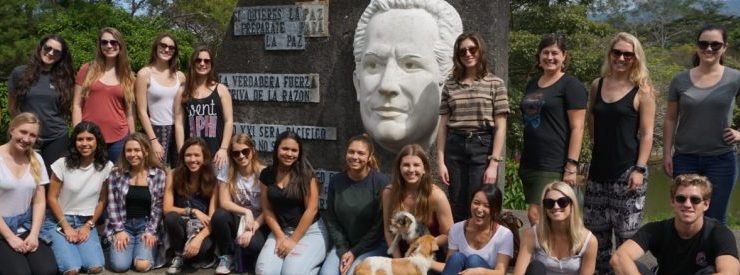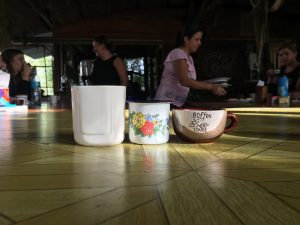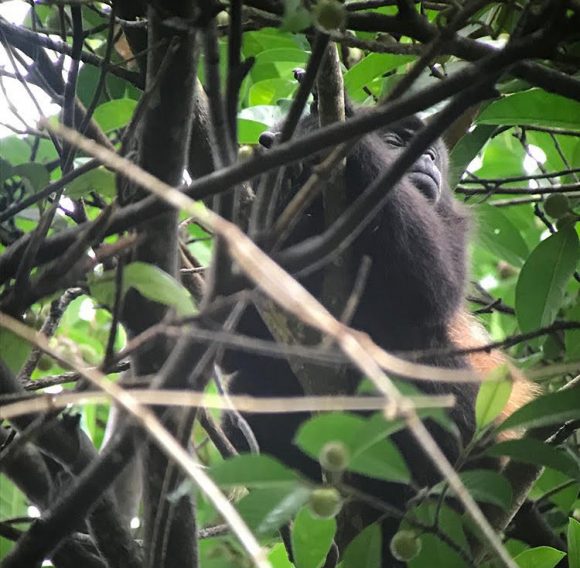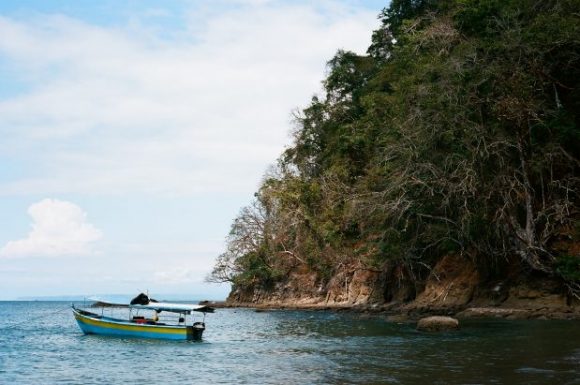
Peace Communication Interterm Course Our 2018 travel course to Costa Rica experience!
February 7, 2018
By Maya Vahid and Kayla Loeb
Peace Communication is an Interterm Travel Course to Costa Rica offered at Chapman University for both undergraduate and graduate students. During the trip, we work closely with the University for Peace, a United Nations mandated university located just outside of San José. For us, this course was quite possibly one of the most impactful learning experiences we had the pleasure of having. In this integrative course for SCC, COM, and Peace Studies students to apply what they have been learning in the classroom to a real world context. This course offers students the chance to analyze and learn about different tools used by organizations throughout Costa Rica. So whether you’re interested in nonprofit or for profit organizations, this travel course is a great opportunity to learn it all!
Kayla Loeb, a Strategic and Corporate Communication major at Chapman, shares her insights: “As an SCC major, I have taken courses on social marketing and non-profit organizations. Although all these courses have been amazing and effective with expanding my knowledge on the subject matter, having had this opportunity to experience classroom context in a real-world setting is extremely valuable. There are so many more limitations and challenges an organization must face that a textbook could hardly prepare you for.”
Maya Vahid, who is pursuing an M.S. in Health and Strategic Communication, found the trip to be an interesting application of her graduate studies to an international context, shares her insights: “The abundance of social marketing present in Costa Rica has helped me realize my ability to do the same in my own community. As a graduate student studying Health Communication, and being interested in marketing healthy behaviors to people, I learned so much from the strategies used in Costa Rica. This trip has helped influence my thought process from ‘marketing can only be done through billboards and commercials’ to ‘marketing can be done anywhere and everywhere’!”

Costa Rica offers numerous personal and academic insights only attainable by traveling to the country and personally visiting and talking with the organizations. Academically speaking, one highlight that stuck out to the two of us during this trip was on our last day touring the coffee farm. Learning about the positives and negatives of organic farming, the challenges of being a farmer, the importance of biodiversity, and the strategy to making good-tasting coffee was an amazing opportunity we are extremely grateful to have had. Gabriel, the owner of Café El Toledo, was captivating and fascinating to listen to and taught us things we wouldn’t have otherwise learned. Another academic highlight important to note was our trip to Boy with a Ball, a nonprofit that helps to improve impoverished communities by empowering young people. Even though the nonprofit organizations that we visited were small, there was so much knowledge our class gained from them. The way in which Boy with a Ball tailors to their target audience with such devotion is something that we really admired. The organization members explained how relationship building is the heart of Boy with a Ball.
As people who already consider themselves to be “open-minded,” we were surprised to have to remind ourselves to be less critical when reflecting on organizations and what they could improve on. Constructive criticism is not constructive at all when an organization does not have the means or resources to change. The two of us have learned how important it is to understand that every organization is different and faces their own obstacles.
 While there were many academic highlights of the trip, there were an abundance of personal ones, too. There were many honorable mentions: simply being immersed in the culture, the El Toledo Coffee Farm, and the Villa Vanilla Spice Farm. As HUGE animal lovers, being able to see species that we’ve never seen before in their natural habitat was such a beautiful experience.
While there were many academic highlights of the trip, there were an abundance of personal ones, too. There were many honorable mentions: simply being immersed in the culture, the El Toledo Coffee Farm, and the Villa Vanilla Spice Farm. As HUGE animal lovers, being able to see species that we’ve never seen before in their natural habitat was such a beautiful experience.
This trip has offered us so many highlights that it is hard not to talk about them all. One personal highlight of the trip was the people. Our peers, professors, the locals, the tour guides, the volunteers, people from UPEACE, and every other single person. Who would’ve thought we’d have to travel to Costa Rica to become so close to people who go to our own school? Who would’ve thought we’d go fishing with our professors? Who would’ve thought we’d dance bachata with the locals at Coopesilencio? Or meet an Uber driver who learned fluent English by watching American movies? None of these things would’ve happened if it weren’t for this travel course. The bonds we made in Costa Rica are special, and was definitely one of our personal highlights of the trip.
We will forever be grateful for the opportunity we had to be part of this trip. The impact that it has had on the both of us is everlasting. We learned so much about ourselves, Costa Rica, for profit and nonprofit organizations, and so much more! 
If you’re unable to study abroad, or want to get a taste of taking a class in another country, we advise you to take this travel course. These 12 days in Costa Rica was such a unique experience of being immersed into a beautiful culture. If you’re interested in learning more about this travel course, feel free to email Dr. Sara LaBelle at labelle@chapman.edu.
Traveling to Costa Rica for this travel course is an unforgettable experience we assure you won’t regret. As they say in Costa Rica… ¡Pura Vida!

